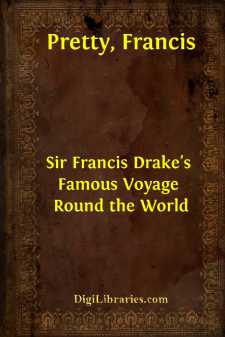Categories
- Antiques & Collectibles 13
- Architecture 36
- Art 48
- Bibles 22
- Biography & Autobiography 813
- Body, Mind & Spirit 142
- Business & Economics 28
- Children's Books 14
- Children's Fiction 11
- Computers 4
- Cooking 94
- Crafts & Hobbies 4
- Drama 346
- Education 46
- Family & Relationships 57
- Fiction 11829
- Games 19
- Gardening 17
- Health & Fitness 34
- History 1377
- House & Home 1
- Humor 147
- Juvenile Fiction 1873
- Juvenile Nonfiction 202
- Language Arts & Disciplines 88
- Law 16
- Literary Collections 686
- Literary Criticism 179
- Mathematics 13
- Medical 41
- Music 40
- Nature 179
- Non-Classifiable 1768
- Performing Arts 7
- Periodicals 1453
- Philosophy 64
- Photography 2
- Poetry 896
- Political Science 203
- Psychology 42
- Reference 154
- Religion 513
- Science 126
- Self-Help 84
- Social Science 81
- Sports & Recreation 34
- Study Aids 3
- Technology & Engineering 59
- Transportation 23
- Travel 463
- True Crime 29
Sir Francis Drake's Famous Voyage Round the World
by: Francis Pretty
Description:
Excerpt
The 15th day of November, in the year of our Lord 1577, Master Francis Drake, with a fleet of five ships and barks, and to the number of 164 men, gentlemen and sailors, departed from Plymouth, giving out his pretended voyage for Alexandria. But the wind falling contrary, he was forced the next morning to put into Falmouth Haven, in Cornwall, where such and so terrible a tempest took us, as few men have seen the like, and was indeed so vehement that all our ships were like to have gone to wrack. But it pleased God to preserve us from that extremity and to afflict us only for that present with these two particulars: the mast of our Admiral, which was the Pelican, was cut overboard for the safeguard of the ship, and the Marigold was driven ashore, and somewhat bruised. For the repairing of which damages we returned again to Plymouth; and having recovered those harms, and brought the ships again to good state, we set forth the second time from Plymouth, and set sail the 13th day of December following.
The 25th day of the same month we fell with the Cape Cantin, upon the coast of Barbary; and coasting along, the 27th day we found an island called Mogador, lying one mile distant from the main. Between which island and the main we found a very good and safe harbour for our ships to ride in, as also very good entrance, and void of any danger. On this island our General erected a pinnace, whereof he brought out of England with him four already framed. While these things were in doing, there came to the water's side some of the inhabitants of the country, shewing forth their flags of truce; which being seen of our General, he sent his ship's boat to the shore to know what they would. They being willing to come aboard, our men left there one man of our company for a pledge, and brought two of theirs aboard our ship; which by signs shewed our General that the next day they would bring some provision, as sheep, capons, and hens, and such like. Whereupon our General bestowed amongst them some linen cloth and shoes, and a javelin, which they very joyfully received, and departed for that time. The next morning they failed not to come again to the water's side. And our General again setting out our boat, one of our men leaping over-rashly ashore, and offering friendly to embrace them, they set violent hands on him, offering a dagger to his throat if he had made any resistance; and so laying him on a horse carried him away. So that a man cannot be too circumspect and wary of himself among such miscreants. Our pinnace being finished, we departed from this place the 30th and last day of December, and coasting along the shore we did descry, not contrary to our expectation, certain canters, which were Spanish fishermen; to whom we gave chase and took three of them. And proceeding further we met with three carvels, and took them also.
The 17th day of January we arrived at Cape Blanco, where we found a ship riding at anchor, within the Cape, and but two simple mariners in her. Which ship we took and carried her further into the harbour, where we remained four days; and in that space our General mustered and trained his men on land in warlike manner, to make them fit for all occasions. In this place we took of the fishermen such necessaries as we wanted, and they could yield us; and leaving here one of our little barks, called the Benedict, we took with us one of theirs which they called canters, being of the burden of 40 tons or thereabouts. All these things being finished we departed this harbour the 22nd of January, carrying along with us one of the Portugal carvels, which was bound to the islands of Cape Verde for salt, whereof good store is made in one of those islands. The master or pilot of that carvel did advertise our General that upon one of those islands, called Mayo, there was great store of dried cabritos (goats), which a few inhabitants there dwelling did yearly make ready for such of the king's ships as did there touch, being bound for his country of Brazil or elsewhere....


